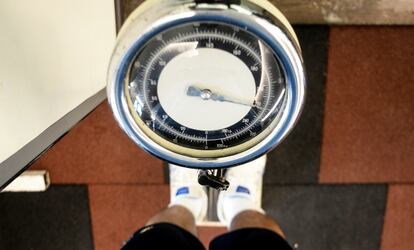A challenge worth the weight, as Galician town looks to shed 100,000kgs
The La Coruña locality Narón has launched an innovative diet project to tackle spiraling obesity rates

The town of Narón in La Coruña is facing a fat challenge: lose a collective 100,000 kilograms between its inhabitants in two years. Sixty percent are overweight but they are stepping up to the plate and attempting to lose four kilos each. And what’s more, they aim to keep it off.
The number of obese children and teenagers had tripled in Spain since 1975
The name of the initiative is 100,000 Motivos de Peso, which entails eating a balanced diet, doing regular exercise and a visit to the doctor once every three months. Starting on February 1, Narón residents can sign up at the health center where their body mass index will be calculated and their waistline measured as they take on the challenge.
The plan is the result of years of work by doctors in Narón and the Health Ministry to try to reduce obesity and generally try to improve quality of life for people in the area.
Carlos Piñeiro, a family doctor in Narón who helped launch the initiative, says it was inspired by a number of projects in the United States. “These challenges have worked in areas of New York and Atlanta so we are following some of their guidelines,” he says. “For example, the call to arms was made by the mayor and the councilor, which is very American.”
Pitching in, restaurants in the area will be offering at least 10 balanced meals to their clientele. There will also be a drive to encourage eating the Atlantic diet – rich in fish, seafood and vegetables – with a website publishing different balanced menus each week. “The main thing is for people to join in,” says Piñeiro. “They should post their own recipes and the nutritionists will analyze them.”
Residents’ associations are also getting involved, organizing workshops to train so-called “health correspondents,” people who can help to promote the initiative and make it as dynamic as possible.
The main thing is for people to join in Family doctor Carlos Piñeiro
The other key factor to losing weight is, of course, keeping active. Nutritional education is being administered along with exercise expertise, while sports from yoga to therapeutic dance are being offered to make the lifestyle shift easier.
Piñeiro insists that he doesn’t want to stigmatize obese members of the population, which is why he has gone out of his way to make it a challenge. But he points out that there is plenty of scientific evidence to support his objectives: if the body mass index of participants drops by 10% in two years, heart disease will fall by 30% and mortality by 20%.
It’s not a case of adults only, either. 100,000 Motivos de Peso is directed at both young and old. Several months ago the World Health Organization published a report saying that the number of obese children and teenagers had tripled in Spain since 1975. And, according to the Galician Institute of Statistics, the percentage of overweight children is five points higher than the national average. Now school children in the area are being encouraged to walk or cycle to school under the vigilance of the local police. “It is scientifically proven that 90% of adults are prepared to change their habits if their children do,” says Piñeiro.
And if some of the participants don’t reach the four-kilogram target, at least the kilos they do drop will help to shore up food banks: for every kilo lost, a kilo of non-perishable food is being donated to food banks.
Are group challenges more effective?
According to the Spanish Society for Obesity Research, 81% of Spaniards are doomed to failure when it comes to diets. This comes as no surprise to us at Verne, where we have experienced first hand how difficult it is to stick to a diet with temptation at every turn – at work, at family dinners, when you're out with friends… So we asked the sports psychologist Carlos Rey if losing weight collectively worked better.
The co-founder of UPAD Psychlogy and Coaching, Rey says that turning it into a challenge as opposed to a health problem helps with motivation. “It’s about kicking off with positive motivation to achieve a desired goal instead of negative motivation to avoid consequences,” he says. “Collective challenges almost always have a positive influence on the population because of their inclusive nature and the pride of belonging to a group.”
Rey does, however, point out that not everyone has the same reaction to group challenges or activities. “While there are those who sign up because of the motivation derived from competition and collective effort, there are always the freeloaders who sidestep responsibility so that others can take it for them,” he says.
English version by Heather Galloway.
Tu suscripción se está usando en otro dispositivo
¿Quieres añadir otro usuario a tu suscripción?
Si continúas leyendo en este dispositivo, no se podrá leer en el otro.
FlechaTu suscripción se está usando en otro dispositivo y solo puedes acceder a EL PAÍS desde un dispositivo a la vez.
Si quieres compartir tu cuenta, cambia tu suscripción a la modalidad Premium, así podrás añadir otro usuario. Cada uno accederá con su propia cuenta de email, lo que os permitirá personalizar vuestra experiencia en EL PAÍS.
¿Tienes una suscripción de empresa? Accede aquí para contratar más cuentas.
En el caso de no saber quién está usando tu cuenta, te recomendamos cambiar tu contraseña aquí.
Si decides continuar compartiendo tu cuenta, este mensaje se mostrará en tu dispositivo y en el de la otra persona que está usando tu cuenta de forma indefinida, afectando a tu experiencia de lectura. Puedes consultar aquí los términos y condiciones de la suscripción digital.









































